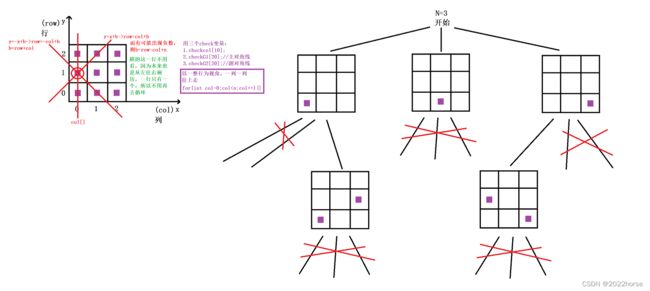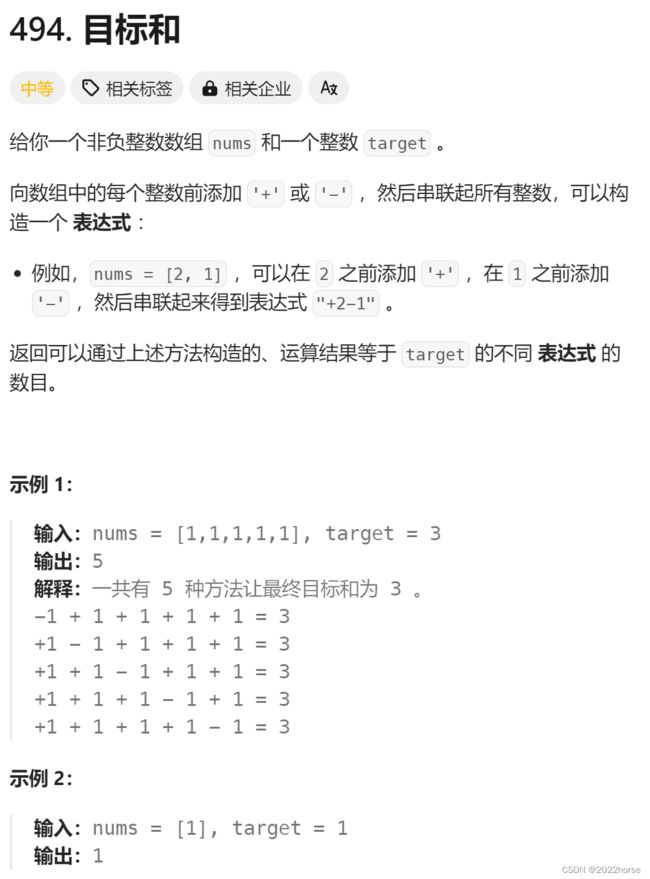【leetcode】深搜、暴搜、回溯、剪枝(C++)2
深搜、暴搜、回溯、剪枝(C++)2
- 一、括号生成
-
- 1、题目描述
- 2、代码
- 3、解析
- 二、组合
-
- 1、题目描述
- 2、代码
- 3、解析
- 三、目标和
-
- 1、题目描述
- 2、代码
- 3、解析
- 四、组合总和
-
- 1、题目描述
- 2、代码
- 3、解析
- 五、字母大小写全排列
-
- 1、题目描述
- 2、代码
- 3、解析
- 六、优美的排列
-
- 1、题目描述
- 2、代码
- 3、解析
- 七、N皇后
-
- 1、题目描述
- 2、代码
- 3、解析
- 八、有效的数独
-
- 1、题目描述
- 2、代码
- 3、解析
一、括号生成
1、题目描述
2、代码
class Solution
{
public:
// 1、全局变量
string path;
vector<string> ret;
int right = 0, left = 0, n = 0;
vector<string> generateParenthesis(int _n)
{
n = _n;
dfs();
return ret;
}
void dfs()
{
// 1、出口
if(right == n)
{
ret.push_back(path);
return;
}
// 2、添加左括号
if(left < n)
{
path.push_back('(');
left++;
dfs();
path.pop_back(); // 恢复现场
left--;
}
if(right < left) // 3、添加右括号
{
path.push_back(')');
right++;
dfs();
path.pop_back(); // 恢复现场
right--;
}
}
};
3、解析
二、组合
1、题目描述
leetcode链接
2、代码
class Solution
{
public:
// 1、全局变量
int n = 0; // 1-n
int k = 0; // 几个数
vector<int> path; // 路径
vector<vector<int>> ret; // 增加的路径函数
vector<vector<int>> combine(int _n, int _k)
{
n = _n;
k = _k;
dfs(1); // 2、dfs
return ret;
}
void dfs(int _pos)
{
// 1、函数递归出口
if(path.size() == k)
{
ret.push_back(path);
return;
}
// 2、遍历--剪枝
for(int pos = _pos; pos <= n; pos++)
{
path.push_back(pos);
dfs(pos + 1); // pos下一个数进行递归实现剪枝
path.pop_back(); // 回溯--恢复现场
}
}
};
3、解析
三、目标和
1、题目描述
2、代码
全局变量的超时代码:
原因在于nums的长度最长有20,其2^20次方太大了。但是leetcode居然通过了。
class Solution
{
public:
// 1、全局变量
int ret; // 返回
int aim; // 目标值
int path; // 路径
int findTargetSumWays(vector<int>& nums, int target)
{
aim = target;
dfs(nums, 0);
return ret;
}
void dfs(vector<int>& nums, int pos)
{
// 1、递归出口
if(pos == nums.size())
{
if(path == aim)
{
ret++;
}
return;
}
// 2、加法
path += nums[pos];
dfs(nums, pos + 1);
path -= nums[pos]; // 恢复现场
// 3、减法
path -= nums[pos];
dfs(nums, pos + 1);
path += nums[pos]; // 恢复现场
}
};
path作为参数的正确代码:
class Solution
{
public:
// 1、全局变量
int ret; // 返回
int aim; // 目标值
int findTargetSumWays(vector<int>& nums, int target)
{
aim = target;
dfs(nums, 0, 0);
return ret;
}
void dfs(vector<int>& nums, int pos, int path)
{
// 1、递归出口
if(pos == nums.size())
{
if(path == aim)
{
ret++;
}
return;
}
// 2、加法
path += nums[pos];
dfs(nums, pos + 1, path);
path -= nums[pos]; // 恢复现场
// 3、减法
path -= nums[pos];
dfs(nums, pos + 1, path);
path += nums[pos]; // 恢复现场
}
};
3、解析
四、组合总和
1、题目描述
2、代码
解法一:
class Solution
{
public:
// 1、全局变量
vector<vector<int>> ret; // 返回
vector<int> path; // 路径
int aim; // 记录target
vector<vector<int>> combinationSum(vector<int>& candidates, int target)
{
aim = target;
dfs(candidates, 0, 0);
return ret;
}
void dfs(vector<int>& nums, int pos, int sum)
{
// 1、递归出口
if(sum == aim)
{
ret.push_back(path);
return;
}
if(sum > aim)
{
return;
}
// 循环
for(int i = pos; i < nums.size(); i++)
{
path.push_back(nums[i]);
sum += nums[i];
dfs(nums, i, sum); // 还是从开始
path.pop_back(); // 恢复现场
sum -= nums[i];
}
}
};
解法二:
class Solution
{
public:
// 1、全局变量
vector<vector<int>> ret; // 返回
vector<int> path; // 路径
int aim; // 记录target
vector<vector<int>> combinationSum(vector<int>& candidates, int target)
{
aim = target;
dfs(candidates, 0, 0);
return ret;
}
void dfs(vector<int>& nums, int pos, int sum)
{
// 1、递归出口
if(sum == aim)
{
ret.push_back(path);
return;
}
if(sum > aim || pos == nums.size())
{
return;
}
// 循环
for(int k = 0; k * nums[pos] + sum <= aim; k++)
{
if(k)
{
path.push_back(nums[pos]);
}
dfs(nums, pos + 1, sum + k * nums[pos]);
}
// 恢复现场
for(int k = 1; k * nums[pos] + sum <= aim; k++)
{
path.pop_back();
}
}
};
3、解析
五、字母大小写全排列
1、题目描述
2、代码
class Solution
{
public:
// 全局变量
string path; // 路径
vector<string> ret; // 返回
vector<string> letterCasePermutation(string s)
{
dfs(s, 0); // 将s这个字符串的第0个位置进行传参
return ret;
}
void dfs(string s, int pos)
{
// 递归出口
if(pos == s.length())
{
ret.push_back(path);
return;
}
// 先记录一下当前的字母
char ch = s[pos];
// 不改变
path.push_back(ch);
dfs(s, pos + 1);
path.pop_back(); // 恢复现场
// 改变
if(ch < '0' || ch > '9')
{
// 进行改变大小写函数
ch = Change(ch);
path.push_back(ch);
dfs(s, pos + 1); // 往下一层递归
path.pop_back(); // 恢复现场
}
}
char Change(char ch)
{
if(ch >= 'a' && ch <= 'z')
{
ch -= 32;
}
else
{
ch += 32;
}
return ch;
}
};
3、解析
六、优美的排列
1、题目描述
2、代码
class Solution
{
public:
// 全局变量
int ret; // 返回
bool check[16]; // 判断相对应位置是true还是false
int countArrangement(int n)
{
dfs(1, n); // 下标从1开始
return ret;
}
void dfs(int pos, int n)
{
// 递归出口
if(pos == n + 1) // 因为是从1开始的
{
ret++; // 只用做数的统计即可
return;
}
// 循环
for(int i = 1; i <= n; i++)
{
if(check[i] == false && (pos % i == 0 || i % pos == 0))
{
check[i] = true; // 表示用了
dfs(pos + 1, n); // 递归到下一层
check[i] = false; // 恢复现场
}
}
}
};
3、解析
七、N皇后
1、题目描述
leetcode链接
2、代码
class Solution
{
public:
// 全局变量
bool checkcol[10]; // 列
bool checkG1[20]; // 主对角线
bool checkG2[20]; // 副对角线
vector<string> path; // 路径
vector<vector<string>> ret; // 返回
int n; // 全局变量n
vector<vector<string>> solveNQueens(int _n)
{
n = _n;
// 初始化棋盘
path.resize(n);
for(int i = 0; i < n; i++)
{
path[i].append(n, '.');
}
dfs(0);
return ret;
}
void dfs(int row) // 行
{
// 递归出口
if(row == n)
{
ret.push_back(path);
return;
}
for(int col = 0; col < n; col++) // 每一行所在的列位置
{
if(checkcol[col] == false/*一整列*/ && checkG1[row - col + n] == false/*y-x+n*/ && checkG2[row + col] == false/*y+x*/) // 判断条件进入
{
path[row][col] = 'Q';
checkcol[col] = checkG1[row - col + n] = checkG2[row + col] = true;
dfs(row + 1);
// 恢复现场
path[row][col] = '.';
checkcol[col] = checkG1[row - col + n] = checkG2[row + col] = false;
}
}
}
};
3、解析
这里我们着重在剪枝方面上面的讲解,我们重点需要明白N皇后剪枝的作用,因为皇后是能吃横的一整行,竖的一整列,主对角线和副对角线一整个,这里原本是要循环四次,但是我们经过想法发现其实只需要判断三个位置即可,第一个位置是竖着的,第二个位置是主对角线,第三个位置是副对角线,因为横着的一行是不需要进行判断的,因为我们的思路是以一整行为一个视角,从左往右依次填的!我们根据简单的数学原理,主对角线是y=x+b的,而由于会出现负数情况,我们左右两边各加一个n即可,我们此时b就为:y-x+n。我们副对角线是y=-x+b,我们的b为y+x即可!那我们接下来的思路画出决策树以后只需要考虑回溯的问题,我们恢复现场只需要将用过的全部变成没用过的即可。

八、有效的数独
1、题目描述
2、代码
class Solution
{
public:
// 全局变量
bool row[9][10]; // 行坐标加值
bool col[9][10]; // 列坐标加值
bool grid[3][3][10]; // 棋盘坐标加值
bool isValidSudoku(vector<vector<char>>& board)
{
for(int i = 0; i < 9; i++) // 行
{
for(int j = 0; j < 9; j++) // 列
{
if(board[i][j] != '.') // 数字的时候
{
int num = board[i][j] - '0'; // 记录一下数
if(row[i][num] == true || col[j][num] == true || grid[i / 3][j / 3][num] == true)
{
return false;
}
row[i][num] = col[j][num] = grid[i / 3][j / 3][num] = true;
}
}
}
return true;
}
};















